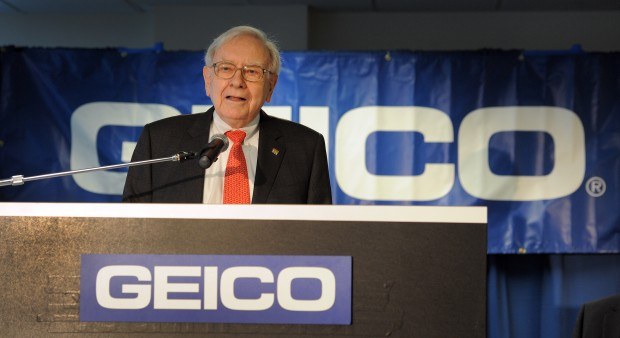Warren Buffett’s Berkshire Hathaway Inc. said second-quarter profit missed analysts’ estimates because higher claims costs fueled an underwriting loss at the insurance segment.
Net income dropped 37 percent to $4.01 billion, or $2,442 a share, from $6.4 billion, or $3,889, a year earlier, the Omaha, Nebraska-based company said Friday in a statement. Operating earnings, which exclude some investment results, were $2,367 a share, compared with the average $3,038 estimate of three analysts surveyed by Bloomberg.
Buffett, 84, built Berkshire over the past five decades into a sprawling operation that owns manufacturers, retailers, electric utilities and one of the largest U.S. railroads. While those operating businesses provide a steady stream of earnings, the company’s results can still fluctuate widely depending on the performance of investments and insurance underwriting.
“The property-and-casualty insurance industry certainly occasionally takes large hits,” said David Kass, a professor at the University of Maryland’s Robert H. Smith School of Business. “What matters is how you do over time.”
The insurance segment posted an underwriting loss of $38 million, compared with a gain of $411 million a year earlier. The [operating profit] contribution from the GEICO auto insurer plunged to $53 million from $393 million on the increased frequency and cost of claims.
Premium Increases
“We are implementing premium rate increases as needed” at GEICO, Berkshire said in a regulatory filing. That echoes the approach at Allstate Corp., the largest publicly traded U.S. auto insurer, where Chief Executive Officer Tom Wilson said a stronger economy led to more auto travel, increasing the number of mishaps on the roads.
The loss at Berkshire Hathaway Reinsurance Group widened to $411 million from $9 million on storm losses in Australia and foreign currency fluctuations.
Berkshire’s net income soared to a record in last year’s second quarter as the company posted profit of more than $2 billion from derivatives and investments. The 2014 figure included a one-time benefit from a share-and-asset swap with Graham Holdings Co., the former publisher of the Washington Post. In this year’s second quarter, the investment and derivative gain was $123 million.
Kraft Heinz
Buffett’s company said that third-quarter results will include a pretax gain of about $7 billion tied to the merger that formed Kraft Heinz Co. in July. Berkshire owns more than a quarter of the combined company after helping to finance the deal.
The gain hasn’t reversed Berkshire’s stock slump this year. Class A shares have slipped 4.7 percent since Dec. 31, trailing the 0.9 percent gain in the Standard & Poor’s 500 Index.
The railroad, BNSF, contributed $963 million to quarterly earnings, compared with $916 million a year earlier. Executive Chairman Matt Rose and CEO Carl Ice plan to spend a record $6 billion this year for upgrades to the network after service delays in 2014.
The investments have helped BNSF weather a slowdown in traffic this year better than its main competitor in the western U.S. Total carloads slipped 0.1 percent at Buffett’s railroad in the quarter, compared with a 5.8 percent drop at Union Pacific Corp.
Berkshire Hathaway Energy Co., the utility business led by Greg Abel, added $502 million to earnings compared with $375 million a year earlier.
Earnings from manufacturing, service and retailing units increased to $1.31 billion in the second quarter from $1.26 billion in the same period in 2014. The group of businesses includes chemical company Lubrizol; McLane, a trucking company; and Fruit of the Loom, which makes underwear and other clothing. Berkshire doesn’t break down results for each business in the segment.
–With assistance from Katherine Chiglinsky in New York.





















 Retired NASCAR Driver Greg Biffle Wasn’t Piloting Plane Before Deadly Crash
Retired NASCAR Driver Greg Biffle Wasn’t Piloting Plane Before Deadly Crash  Earnings Wrap-Up: AXIS Expanding Insurance Biz, Shrinking Re Book
Earnings Wrap-Up: AXIS Expanding Insurance Biz, Shrinking Re Book  What Analysts Are Saying About the 2026 P/C Insurance Market
What Analysts Are Saying About the 2026 P/C Insurance Market  How Americans Are Using AI at Work: Gallup Poll
How Americans Are Using AI at Work: Gallup Poll 









